Posts written by Guest Authors
Are you interested in contributing a gem of Zettelkasten wisdom? Get in touch with us via e-mail: write to hi@zettelkasten.de!
2022
Field Report #6: The Zettelkasten Method Works for PhD Students Very Well!
This is a guest post by Jeannel King (@jeannelking on our forums), a follow up to her Zettelkasten use in class from 2 years ago. Enjoy! Update now that I’m three years in to my PhD program and am about to start on my lit reviews and dissertation research…
Playing the Zettelkasten RPG Through Arbitrary Constraints
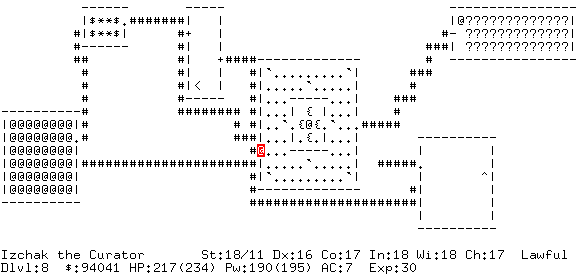
How to make principles of roguelike RPGs and self-imposed constraints work for you when using a Zettelkasten.
Introducing the Antinet Zettelkasten

My goal is twofold: (1) I hope to motivate those who prefer paper-based thinking systems, and (2) I hope to present an alternative perspective for those who use digital Zettelkasten systems. I hope my perspective will add one or two valuable insights you can add to your Zettelkasten workflow (even a digital one).
Using Cartography as a Metaphor for Investigating the Great Folgezettel Debate
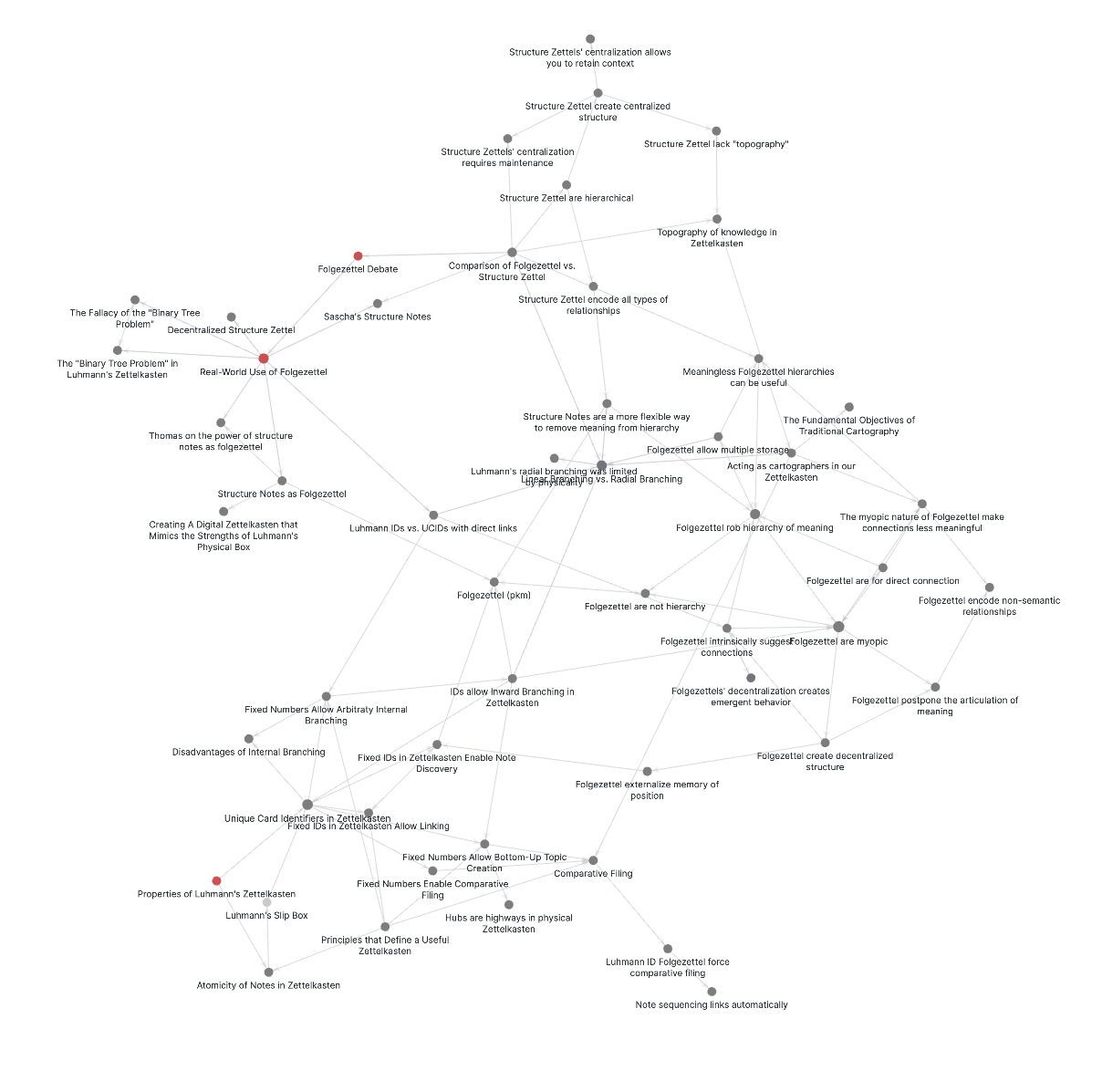
Austin Ha compared Folgezettel and structure notes using tools of cartography, providing replicable example notes (download at the bottom).
From Fleeting Notes to Project Notes – Concepts of "How to Take Smart Notes" by Sönke Ahrens
Ahrens discusses five categories of notes: three main descriptive categories of notes: fleeting notes, permanent notes and project notes; and two subcategories of permanent notes: literature notes and Zettels. These terms are defined and discussed in this article.
Field Report #4: I spent six months using a Zettelkasten to write my thesis. Here's what I learned
We users of a Zettelkasten strive for a set of ideals: that we don't only collect knowledge but integrate it and use it in the service of our own knowledge work; that use of a Zettelkasten generates new connections and insights for us in that work (as Luhmann said, as a conversation partner); that our organization of notes allows for clear thinking and organized ideas.
2021
Field Report #2: Lessons Learned From Processing "Team of Rivals"
My research area is machine learning. My first zettel was created on 02/23/2020 and most of them focus on my research area or research in general. This mostly consists of extra the key ideas in short 4-10 page article. Throughout my life I have read many books, but I remember little about them. For instance, I say books like “The Double Helix” or “The Art of Learning” made a big impact on me, but outside of a few anecdotes, I remember nothing. More than that, I have no notes to go back and refer to. My plan this year was to change this and systematically process any book I read.
Field Report #1: A PhD About Writing with His Zettelkasten
It is not difficult to find articles that herald the benefits of using a Zettelkasten and because of this, a dose of skepticism is perhaps healthy. Do you really get magically productive? Produce world-class research? Uncover secret connections for elevated understanding? Write 10 books spontaneously?
2020
All notes are malleable: Strive for permanently useful notes, not permanently unchanging notes

Here’s a highlight from the forum from recent days. User @zappino4 asked: I am trying to understand the relationship between literature notes and permanent notes. My doubts are the following:
PhD Student Reporting What It's Like to Use a Zettelkasten for Classes
This is a recent highlight from the forums: Jeannel King reported how the Zettelkasten Method and preparing for a PhD at university work together. This is the first semester where I’m using my Zettelkasten for my courses (PhD program in humanistic psychology, creativity studies specialization). Now that I’ve got some reps under my belt, here’s how it’s working so far:
2019
The Zettelkasten as a Lattice of Thought Strings

Please welcome Gerrit Scholle, aka gescho from the forums! Gerrit kindly took the time to write up his recent thoughts as a self-contained blog post, with colored pencil drawings and all! Enjoy.
Trust the Process
This is a recent highlight from the forums. Nick Milo posted this the other day; we’d like to feature his essay on the blog so you don’t miss it. The following is a verbatim copy of his forum post, plus a link to @daneb’s post that @nickmilo22 added for context.
2017
Using Trello as a Zettel Note Archive
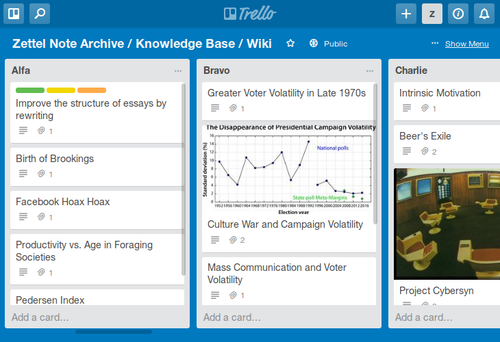
If you paid attention to the comments feed of the past couple of months, you will know Nick already. He’s tinkering with interesting plain text stuff – I won’t spoil anything right now; I hope Nick will some day show us the power of plumber, instead.
2015
OneNote Review
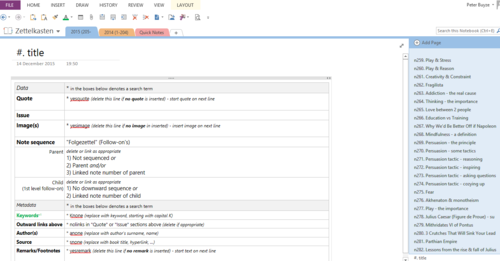
Today DutchPete, one of the most avid commenters on this blog, will help us fill the gap in software reviews for Windows by talking about OneNote as a Zettelkasten note archive. OneNote is part of the Microsoft Office family and thus available for a lot of different platforms, too, so this is not strictly speaking a PC-centered review. Now let’s see which conventions and techniques make DutchPete productive.
Switching from Zkn³ to a Plain Text Approach
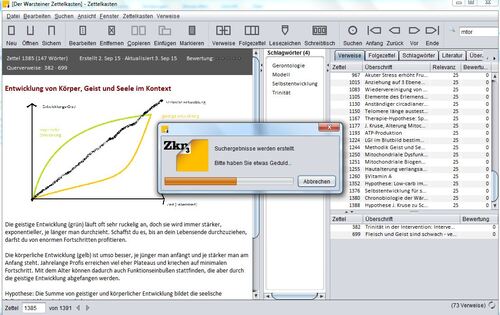
Erik Pfeiffer joins us today to write about his experience with the well-known Zettelkasten application by Daniel Lüdecke. Read the full article to get to know the good and the bad from Erik's point of view and why he switched to a plain text approach later.
2014
DEVONthink as a Zettelkasten Note Archive

Today we host our good friend Marko as he tells us of the basic note-taking capabilities of DEVONthink and its appliance to the Zettelkasten method. The Zettelkasten method propagates heavy use of the note archive, stuffed with your own interpretations of things you have learned. The user we have in mind usually is a student of humanities, reading a lot and writing a lot. DEVONthink is capable of doing far more than managing notes, though. It can also in part replace a reference manager. Or you may benefit from its ability to deal with large amounts of files when it comes to seeking similarities in original sources. This can become really interesting for historians, for example.